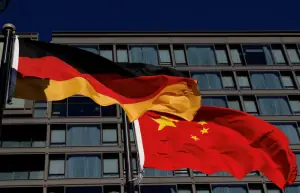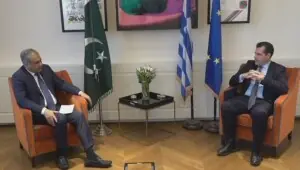Pakistan to discuss Extended Fund Facility with IMF in April, says finance czar
3 min readPakistan will discuss an Extended Fund Facility (EFF) with the International Monetary Fund (IMF) in Washington next month, Finance Minister Muhammad Aurangzeb said on Friday, as the country looks to alleviate a full-scale economic crisis.
Cash-strapped Pakistan’s standby $3 billion arrangement with the global lender expires on April 11, and the two sides reached a staff-level agreement regarding the disbursal of the final tranche of $1.1 billion earlier this week.
“We have expressed our strong interests in an Extended Fund Facility with the IMF, but the quantum is not clear yet,” Aurangzeb said at a media briefing, adding that the lender was “very receptive” to the request.
The US has also been “very supportive” in the matter, the minister said.
Prime Minister Shehbaz Sharif, after he was sworn in for his second consecutive term following a national election marred by allegations of rigging, had directed his finance team to begin work on seeking an extended fund facility from the IMF.
He termed a long-term bailout from the IMF “inevitable” on Thursday.
The IMF had also said it would support formulating a new economic program for the country if it asks for one.
The global lender’s rescue package last summer had helped Pakistan avert a sovereign default but, to secure it, the country had to revise its budget, and raise interest rates, taxes, and electricity and gas prices.
As a result, during the period, Pakistan struggled through inflation as high as 38%, historic depreciation in its currency, and contraction of the economy.
Bonds
Pakistan will also look to bonds in the international market to help stabilise its economy, Aurangzeb said at Friday’s briefing, adding that, in the meantime, work is being done on panda bonds.
“Once our credit rating improves, we will be going to the international market for bonds,” he said.
The finance minister has been keen to capitalise on Pakistan’s relationship with China and had earlier also expressed his intention to tap into the Chinese bond market.
In an interview with Bloomberg on Friday, he said Pakistan plans to sell as much as $300 million in panda bonds this year.
Selling yuan-denominated debt will allow Pakistan to diversify its funding sources and reach investors in a new market, Aurangzeb, said.
It’s something “we should have looked at quite frankly some time back,” he said. China has the “second-largest and deepest bond market in the world” and it is the “right thing to do for the country” to tap the market, given Pakistan has already sold dollar and eurobonds, he said.
A former banker from JPMorgan Chase & Co, Aurangzeb, 59, was picked as finance minister by Prime Minister Shehbaz Sharif in March after a contentious election.
Also, read this
Pakistan rejects IMF’s proposal to revisit NFC award: sources
US supports Pakistan’s efforts to break free from ‘vicious cycle of debt’
IMF aims to ‘quickly’ reach agreement with Pakistan on programme revival
He takes office at a time when economic pessimism in the country is at a record high and the government is trying to avoid defaulting on its debt. Pakistan has the highest inflation rate in Asia of more than 20% and faces $24 billion of external debt payments in the fiscal year starting July, three times its foreign-exchange reserves.
The finance minister said the government’s cash balances are strong enough that it’s able to pay its debts on time. The payments are unlikely to put pressure on the currency, and he expects the rupee to remain stable, he said.
“I don’t really see a huge pressure on the rupee at this point in time,” he said. “As we go forward, I think it’s going to remain range bound around these levels.” The “wildcard” is oil prices, he added, which remain uncertain given the Red Sea attacks.
For the latest news, follow us on Twitter @Aaj_Urdu. We are also on Facebook, Instagram and YouTube.



























Comments are closed on this story.